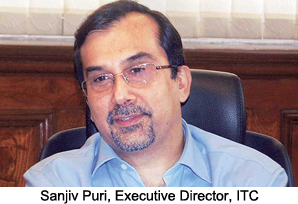We are extremely pleased with our FMCG diversification: Sanjiv Puri
March 21, 2016
Interview with Executive Director, ITC
 The environment for cigarettes couldn't be more challenging. Yet, some brokerages have upgraded the stock of tobacco major ITC on two grounds - excise duty rises can be easily passed on to consumers by the market leader; plus, this is expected to be a good year for the conglomerate's non-cigarette fast moving consumer goods (FMCG) business. Sanjiv Puri, executive director, talks to Ishita Ayan Dutt on the road ahead. Edited excerpts:
The environment for cigarettes couldn't be more challenging. Yet, some brokerages have upgraded the stock of tobacco major ITC on two grounds - excise duty rises can be easily passed on to consumers by the market leader; plus, this is expected to be a good year for the conglomerate's non-cigarette fast moving consumer goods (FMCG) business. Sanjiv Puri, executive director, talks to Ishita Ayan Dutt on the road ahead. Edited excerpts:Analysts believe this will be a good year for your non-cigarette FMCG business. Is that correct?
The growth the FMCG sector enjoyed some years before is not there; it was quite muted last year. But, we believe there is great potential. The steps the government is taking in reviving the economy, the focus on infrastructure, railways, MGNREGS (the rural work guarantee), pay commission implementation and armed forces' pensions should stimulate the economy.
In the medium to long term, we are optimistic about the sector and that's why we continue to invest in 'Make in India'. We have 65 projects with an outlay of Rs 25,000 crore across the country's length and breadth. We are setting up 12 integrated consumer goods manufacturing facilities in various parts. And, looking forward to a better year for FMCG.
Is ITC exploring new categories in FMCG?
In the recent past, we have gone into two new ones. One is juices, with B Natural; the second is dairy, with Aashirvad Svasti Ghee. We continue to explore newer categories; as and when we finalise the plans, we will launch.
There is also opportunity within the categories we are currently in, sub-segments where we are not sufficiently represented. For example, within biscuits, we are the market leaders in the cream segment but there are others where we need to offer more. That will happen, as well as new category interventions.
When are you going to expand the dairy offering?
Ghee has been launched in the south and over time, we will take it to other parts. We will expand the footprint and get into newer products soon. We are exploring many sub-products.
Will the new offerings be this year?
Certainly.
Given the challenging environment in cigarettes, is ITC vindicated in creating multiple (other) drivers of growth?
Diversification reasons are beyond that. ITC's core proposition is to invest in areas that contribute in nation building. We are able to make a meaningful contribution to society in all sectors that we are present. Our method of creating an inclusive value chain generates livelihood for six million people; our e-choupal network empowers four million farmers; from an environmental perspective, we are the only company in the world to be carbon-positive; we are water-positive, solid waste recycling- positive and, over two decades, the compounded annual growth rate on shareholder return is more than 20 per cent.
Is the company satisfied with the progress in diversifications?
We are extremely pleased with the progress. In traditional segments, we have a leadership. In newer businesses where we have been present for more than a decade, we are leaders. In some nascent businesses, we are number two.
What is your FMCG brand turnover?
Our consumer spend is between Rs 11,000 crore and Rs 12,000 crore. We are market leaders in some categories like atta, notebooks, cream biscuits. Bingo (salted snacks) and Yippee (instant noodles) are number two in their segments. All this has happened in a very short span of time.
Our FMCG (annual) turnover is $1.5 billion (about Rs 10,000 crore) and we are extremely encouraged. We believe that we will see significant growth, particularly as the economy picks up. And, by getting into newer spaces.
Is foods the biggest contributor to the non-cigarette FMCG segment?
Foods crossed $1 billion last year.
What is the scope for expanding that category?
There is scope for deepening the categories we are in and in newer categories.
Would expansion be through the organic route or acquisitions?
Organic is likely to happen. For inorganic, if there is an opportunity synergistic with our portfolio, like B Natural or Savlon, it could happen. So, there is nothing specific we are working on but it will happen because we have a target of achieving Rs 100,000 (annual) revenue from new FMCG businesses.
Traditionally, ITC has stayed away from acquisitions.
We have been open to acquisitions. If something is synergistic with our portfolio and available at the right price, we are open.
One reason we have focused on building brands organically is because we want to build world-class Indian brands. We want to leverage our institutional strength to bring a superior value proposition to the market.
A simple example - we customise our atta blend to the region and we are able to do it because we have identity preservation at the farm gate through our e-choupal network. So, some of these things need to be done organically.
To back this, we have invested in a state-of-the-art research & development centre in Bengaluru. We have 350 scientists there and over 400 patents. So, organic will be a important part of our strategy. If there is an inorganic opportunity that complements our strategy at the right valuation, we are open to that.
How has the steep taxation in cigarettes affected the industry?
The excise duty impact here since 2012-13, at a per-unit level, has gone up cumulatively by 118 per cent. The net result is that the illegal industry has grown. Today, of every four cigarettes (sold), one is illegal. They come from across the borders or are domestically produced, don't carry the statutory conditions and are often made in suspect hygienic conditions.
India has a unique consumption pattern. Legal cigarettes are actually only 11 per cent of the tobacco consumed. It has come down from about 21 per cent, while overall tobacco consumption in India has increased. So, excessive taxation is actually counter-productive. It is a loss for the 'Make in India' agenda.
How do you see it affecting pricing power?
Steep taxation has led to massive diversion to tax evaded illegal and contraband cigarettes. Such illegal cigarettes deprive the exchequer, impact farmers' incomes and puts pressure on the legal cigarette industry.
What do you think of the parliamentary panel's recommendations on pictorial warnings?
The top three cigarette consuming countries -- America, China and Japan -- have not adopted pictorial warnings. These warnings put Indian brands at a disadvantage. Also, the consumer might think packs with only text warnings making their way to India are safer.
Advertisement








